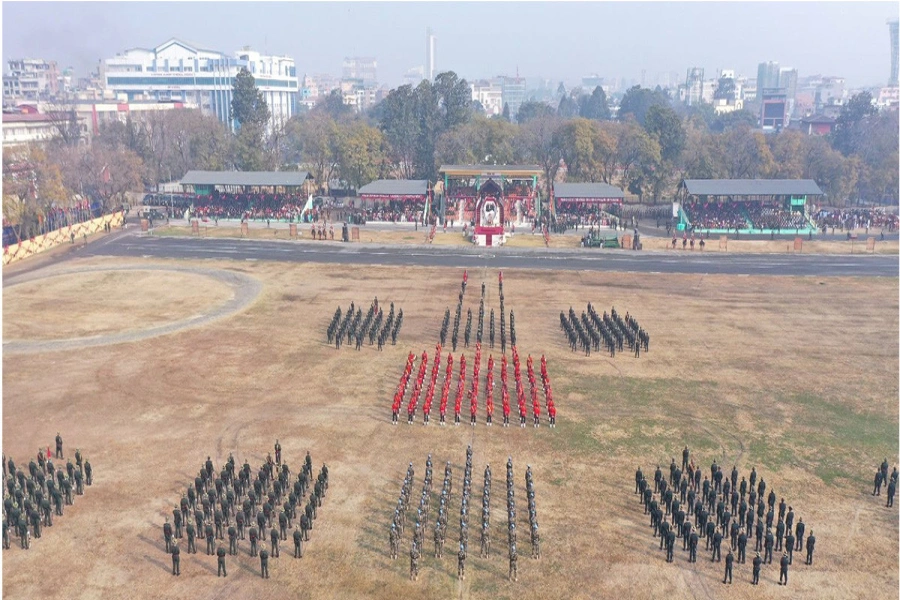KATHMANDU, June 5: Former Prime Minister Madhav Kumar Nepal, who has come under the radar of the Commission for the Investigation of Abuse of Authority (CIAA) in connection with the land ceiling exemption granted to Patanjali, has denied any involvement in the case.
During his statement recorded by the CIAA on March 30, 2025 Nepal clarified that he had no malicious intent in the matter.
“My belief has always been that any decision I make must align with the country’s laws, rules, and due process for the welfare of the nation and its people. I request not to be doubted or questioned about my intent,” he said.
He added that if it is proven that any wrongdoing was committed by him with deliberate intent, he is ready to face full punishment. “As far as my intent or malice is concerned, I say with certainty that I had no ill intention, personal benefit, or self-interest. I have not directed or instructed anyone to act against the law or procedure. I have no involvement in such acts. If any wrongdoing was knowingly committed by me, I am prepared to accept the entire punishment,” Nepal said.
Full statement highlights:
PM Oli challenges former King Shah to contest 2084 BS elections

Nepal said he does not recall the decision made during the Cabinet meeting on January 13, 2010, which approved land purchases exceeding the ceiling limit for Patanjali Yogpeeth and Ayurveda Company Nepal. This was during a time when the 2005 policy on allowing industrial enterprises to hold land beyond the ceiling was under suspension.
He said, “I do not clearly remember how and on what basis the decision of January 13, 2010, was made. The issue might have arisen in the context of some problem. However, I believe that any work must be done within the legal framework, ensuring no harm to the country, and ideally benefitting the nation and its people.”
He suggested that once the concerned ministries or the Chief Secretary proposed a legal solution to the issue and ministers agreed, the decision must have been made accordingly. He said he does not recall the exact reasons for granting the exemption to Patanjali, but emphasized that any decision must be made in accordance with rules and procedures.
Nepal stressed that any legal and institutional matters linked to this issue should have been addressed by the responsible officials and agencies. He reiterated, “I want to emphasize that no decision from my side was motivated by personal gain, ill intention, or a wrong objective.”
According to him, before the decisions were made by the Cabinet and its Bill Committee in January and February 2010, Patanjali had already purchased more than 550 ropanis of land in Kavrepalanchok district and mortgaged the land at Sunrise Bank on February 27, 2009 for a loan. Nepal said he had no knowledge or recollection of whether the Cabinet decisions aimed to legalize this already completed illegal action.
Nepal explained that before any proposal is submitted to the Cabinet, it goes through several procedural steps. He said it is the responsibility of the Chief Secretary and their team to check the legality of the proposals. If they find the proposal appropriate, it is presented to the Prime Minister and then to the Cabinet. If questions or doubts arise, the matter is subjected to further discussion. Otherwise, the Cabinet passes it. He said, “The Prime Minister alone cannot make any decision. I am not aware of such practice.”
He also stated he does not recall the purpose for which Patanjali sought land beyond the ceiling limit or on what basis the decision was made. He said he doesn’t remember how the Cabinet later, on February 20, 2010, approved land sales after the Bill Committee had restricted sales earlier on March 19, 2010.
Nepal also said he does not recall the note from the then Minister for Land Reform and Management, who reportedly wrote that the proposal for land sale and exchange was presented following oral instructions from the Prime Minister. Nepal said he does not remember any such directive.
He said, “I strongly oppose any action driven by personal or selfish interests. I have not issued any instruction or directive, even to ministers, to violate rules or harm the country. I do not remember what land Patanjali tried to sell, how much, or how and when the land was registered in its name. I do not recall the basis for granting permission to sell and exchange such land.”
Nepal reiterated, “As far as my intent and conduct are concerned, I affirm that there was no ill intention, personal benefit, or self-interest in this matter. I have not instructed anyone to act unlawfully or against procedures. I have no involvement in such issues. I have always believed that decisions must be made in line with national laws, procedures, and in the interest of the country and its people. I urge not to doubt me or question my intentions. If any wrongdoing was deliberately committed by me, I am ready to accept the full punishment.”
He concluded by stating his full support for stopping any form of wrongdoing. “I reiterate that none of my decisions were made out of personal gain or with the intention of harming the country.”






































